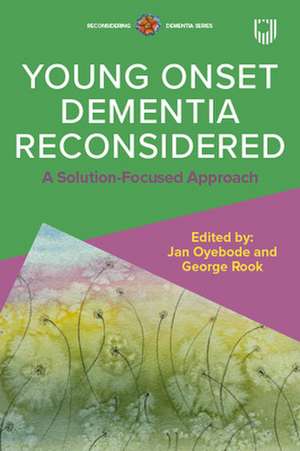Reconsidering Young Onset Dementia
Autor Jan Oyebode, George Rooken Limba Engleză Paperback – 20 ian 2025
Tessa Gutteridge, Chair, Young Dementia Network, Programme Director for Young Onset Dementia, Dementia UK
“This superb text is essential reading for anyone with an interest in young-onset dementia. [It is an] inspiring resource for people with young-onset dementia, family members, health and social care practitioners, researchers, commissioners and policymakers.”
Linda Clare, Professor of Clinical Psychology of Ageing and Dementia, University of Exeter, UK.
This solution-focused book, authored by leading experts from the UK, Canada, Norway and the Netherlands, delves into the many areas of life affected by dementia. When dementia occurs under 65 there are unique challenges and the impact on life is very different from diagnosis at a later age. The authors synthesise research to provide practical advice and information on living well, as well as the types of support available to those living with young onset dementia and their families.
Young Onset Dementia Reconsidered is accessibly written and split into three sections to reflect key outcomes important to people living with young onset dementia: to maintain control over their own lives, to retain a sense of identity and to feel connected with others.
This book:
- Began from conversations with people living with young onset dementia and amplifies their voices throughout
- Contains coverage of a breadth of areas, including the social, psychological, employment, financial, legal and creative, as well as health and symptom-related aspects
- Is grounded in evidence and research and takes a solution-focused approach.
The Reconsidering Dementia Series is an interdisciplinary series published by Open University Press that covers contemporary issues to challenge and engage readers in thinking deeply about the topic. The dementia field has developed rapidly in its scope and practice over the past ten years and books in this series will unpack not only what this means for the student, academic and practitioner, but also for all those affected by dementia.
Series Editors: Dr Keith Oliver and Professor Dawn Brooker MBE.
Jan Oyebode is Professor of Dementia Care at the Centre for Applied Dementia Studies, University of Bradford, UK where her current research focuses on how to provide better support for people with young onset dementia. She is also a member of the Young Dementia Network Steering Group.
George Rook has worked as an accountant, English teacher and school business manager. He was diagnosed with young onset dementia aged 62, and has since then been increasingly involved in activism, speaking and blogging about living with dementia. He is now also engaged in research projects. George learned to paint during Covid and gets huge satisfaction from it.
Preț: 148.60 lei
Preț vechi: 200.41 lei
-26% Nou
Puncte Express: 223
Preț estimativ în valută:
28.44€ • 29.38$ • 23.67£
28.44€ • 29.38$ • 23.67£
Carte disponibilă
Livrare economică 06-12 martie
Preluare comenzi: 021 569.72.76
Specificații
ISBN-13: 9780335252497
ISBN-10: 0335252494
Pagini: 322
Dimensiuni: 152 x 229 mm
Greutate: 0.43 kg
Editura: McGraw Hill Education
Colecția Open University Press
Locul publicării:United Kingdom
ISBN-10: 0335252494
Pagini: 322
Dimensiuni: 152 x 229 mm
Greutate: 0.43 kg
Editura: McGraw Hill Education
Colecția Open University Press
Locul publicării:United Kingdom
Cuprins
Foreword
1.Introduction and overview
2.Being diagnosed: How sensitive delivery of diagnosis can be empowering
3.Managing the money aspects
4.Technology as an aid to independence
5.Supporting independence in daily life
6.Varying diagnoses, varied needs
7.Having a voice in planning services
8.Recognising cultural dimensions of diversity
9.Employment issues
10.Meaningful occupation, including age appropriate physically and creative activities
11.Involving YPD in research
12.Carers’ identity and well-being
13.Well-being and identity of children and young people
14.Maintaining identity over time
15.Sustaining family relationships
16.Gaining mutual support from peers and communities
17.Conclusions
1.Introduction and overview
2.Being diagnosed: How sensitive delivery of diagnosis can be empowering
3.Managing the money aspects
4.Technology as an aid to independence
5.Supporting independence in daily life
6.Varying diagnoses, varied needs
7.Having a voice in planning services
8.Recognising cultural dimensions of diversity
9.Employment issues
10.Meaningful occupation, including age appropriate physically and creative activities
11.Involving YPD in research
12.Carers’ identity and well-being
13.Well-being and identity of children and young people
14.Maintaining identity over time
15.Sustaining family relationships
16.Gaining mutual support from peers and communities
17.Conclusions
